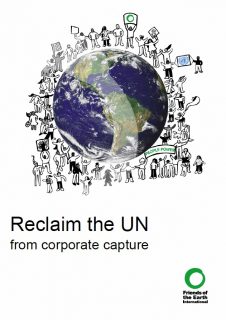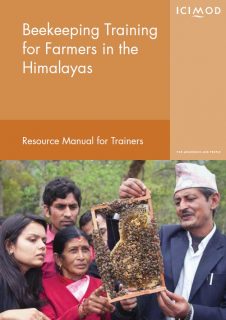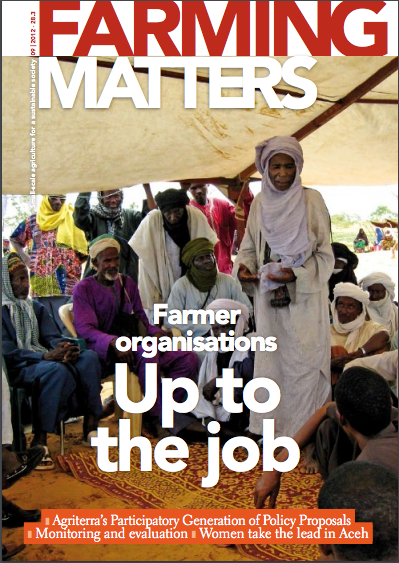Reclaim the UN from corporate capture / Beekeeping training for farmers in the Himalayas / To cook a continent / Learning for sustainability in times of accelerating change / Women reclaiming sustainable livelihoods / The great food robbery and more
Reclaim the UN from corporate capture
FOEI, 2012.
Friends of the Earth International, Amsterdam. 32 pages.

Despite its problems, the UN is probably the most democratic and appropriate global institution to solve the climate, environmental, financial and food crises. Many would argue, however, that UN policies, initiatives and negotiations are increasingly shaped by large corporations and businesses. The emergence of a pro-corporate ideology and the increased financial dependence of the UN on multinational corporations has coincided with a shift from policies and measures that address the problems created by these businesses, to policies and measures where corporations feature as part of the solution. This publication explores the idea of “corporate capture” in different programmes and proposals, including the Convention on Biological Diversity and the Sustainable Energy for All (SE4ALL) initiative.
Beekeeping training for farmers in the Himalayas: Resource manual for trainers

ICIMOD Kathmandu. 178 pages.
Pollinator bees play an important role in agricultural production, forestry and the maintenance of biodiversity. Pollinated plants make up one third of human diets; 80% of that pollination is done by honey bees. The decline of natural habitats and the increased use of insecticides are now threatening these insects, making the management of domestic bees more important. Bee products, like honey and beeswax, can also be an important source of income, nutrition and medicine. The objective of this training manual is “to build the capacity of family and other related individuals and organisations in managing bee colonies”, and with it enhance both honey production and pollination services in the Himalayan region.
To cook a continent: Destructive extraction and the climate crisis in Africa
N. Bassey, 2012.
Fahamu Books and Pambazuka Press, Cape Town. 190 pages.
Africa is rich. It has 75% of the world’s platinum metals, 50% of the gold, 45-50% of the diamonds, 25-30 % of the bauxite and 10% of the nickel and copper. In this book Nnimmo Bassey, alternative Nobel prize laureate and chair of Friends of the Earth International, gives an extensive and empirically rich description of how Africa’s natural resource wealth has turned into a curse. It shows how the structural adjustment programmes (SAPs) of the World Bank and the IMF, and the capture of Africa’s resources by multinational corporations, have led to major social and environmental disasters in Africa, and how this has contributed to the climate crisis.
Learning for sustainability in times of accelerating change
A.E.J. Wals and P.B. Corcoran (eds.), 2012.
Wageningen Academic Publishers, Wageningen. 550 pages.
With a growing pile of complex information about sustainability, some of which is clearly rhetoric designed to serve commercial interests, as well as disagreements amongst scientists, it is often difficult to decide what is and what is not sustainable. According to this book, new learning arrangements are needed in order to address the challenges facing us, such as the loss of biodiversity or the exploitation of a region’s natural resources. The first part of the book addresses the relationship between science and society, focusing on the participation of scientists in public and political debates and on their involvement with different stakeholders to co-create solutions. In the second part the authors explore how the relationship between “people” and “the planet” can be restored. The final part focuses on the role of education and learning in bringing this all into practice.
Women reclaiming sustainable livelihoods: Spaces lost, spaces gained
W. Harcourt, 2012.
Palgrave Macmillan, New York. 275 pages.
This is the first book in a series on women, development and social change. It claims that “the current development trend towards eco-efficiency has obfuscated inequities in the gender distribution of production/reproduction and consumption work”. The book, with chapters written by women from ten different countries, shows how changing policy narratives have opened up some spaces for women seeking sustainable livelihoods, and closed others. This is done by looking at different cases that show how women engage in the struggle for sustainable livelihoods, and how they deal and negotiate with power structures in their day-to-day lives.
The great food robbery: How corporations control food, grab land and destroy the climate
GRAIN, 2012.
GRAIN, Barcelona. 164 pages.
Although more than enough food is produced to feed the world, more than a billion people continue to suffer from hunger. Drawing on extensive research conducted by GRAIN, this book argues that the crisis in the global food system is the result of the expansion of a corporate-driven system that excessively relies on industrial, large-scale, agriculture. Considering a wide range of issues, such as the climate crisis and land grabbing, the authors look at the strategies and tactics employed by corporations to expand this industrial food system, and how this destroys traditional or local food systems and the environment.
Farmer organisations
There is a variety of resources available on farmer organisations. Practical manuals to support the setup of co-operatives include “Starting a cooperative” (R. Koopmans, 2006), “Project design manual: A step by step tool to support the development of cooperatives and other forms of self-help organisations” (ILO, 2010) and the distance learning CD-ROM “Understanding and supporting rural producer organisations” (FAO, 2006). Other interesting documents include “Producer organisations and market chains: Facilitating trajectories of change in developing countries” (G. Ton, J. Bijman, J. Oorthuizen, 2007), “Dealing with small scale producers (E. Mangnus and B. de Steenhuijsen Piters, 2010) and Alexander Chayanov’s classic, but still highly relevant, “Theory of peasant co-operatives”.
The United Nations proclaimed 2012 as the International Year of Co-operatives; relevant resources and activities can be found on the dedicated website. Readers can also find more and more information on territorial and environmental cooperatives. Interesting papers include “Territorial cooperative networks: New social carriers for endogenous rural development” (Rooij, 2006) and “Peasants, territorial cooperatives and the agrarian question” (J.D. van der Ploeg, 2010).
Information for and about farmer organisations can also be found on the websites of different membership organisations such as the International Federation of Agricultural Producers (IFAP) and La Via Campesina. (LvdB)

